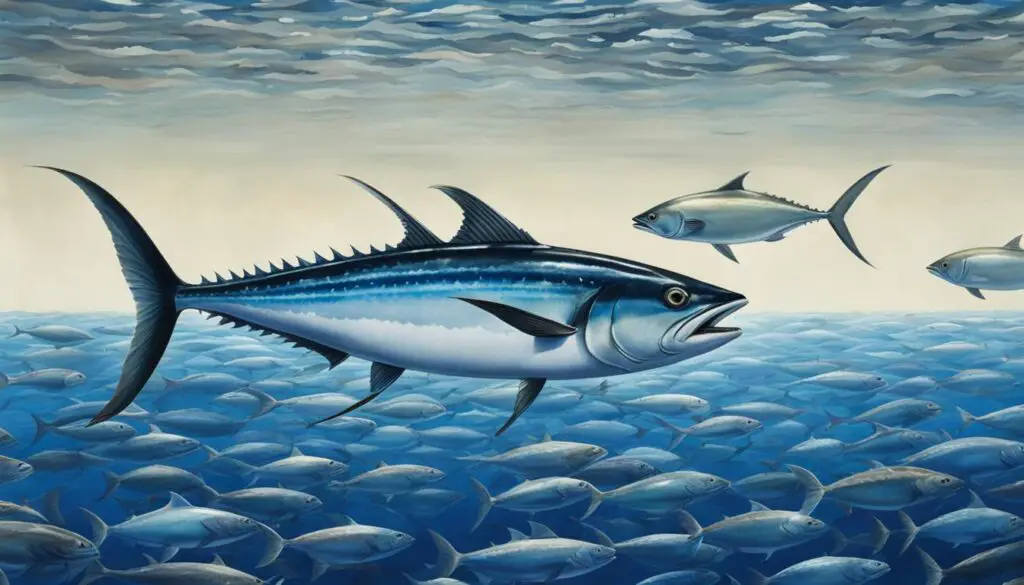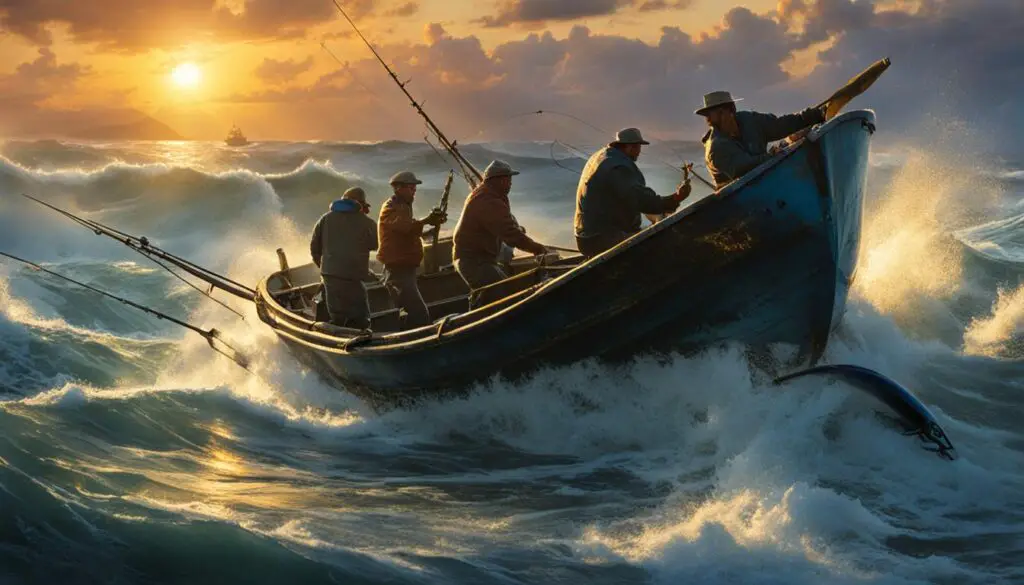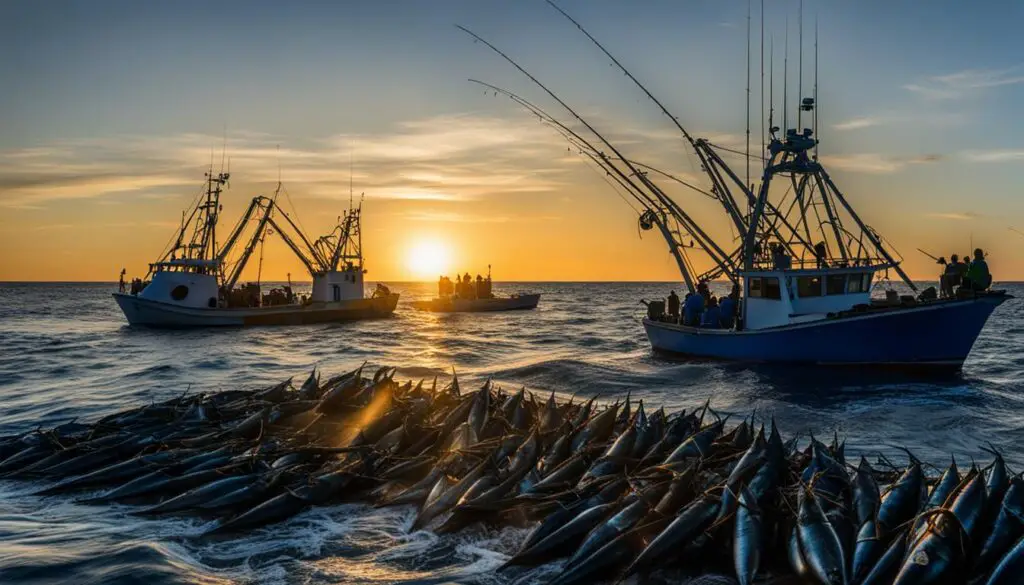Have you ever wondered how much the cast of the popular TV show Wicked Tuna makes? Well, you’re in luck! In this article, we’ll dive into the earnings of the Wicked Tuna cast and reveal some surprising figures. Whether you’re a fan of the show or just curious about the world of tuna fishing, you won’t want to miss this inside look at their salaries and earnings.
Key Takeaways:
- The cast of Wicked Tuna earns an average of $10,000 per episode.
- Captain Dave Carraro is the highest earner, making $600,000.
- TJ Ott and Captain Dave Marciano both earn $500,000 each.
- Paul Hebert and Tyler McLaughlin have a combined net worth of $400,000.
- Deckhands on Wicked Tuna can earn up to $300 per day.
The Biggest Fish Caught by the Wicked Tuna Cast
The Wicked Tuna cast has demonstrated their expertise in reeling in some truly mammoth fish. From impressive bluefin tuna to record-breaking catches, their achievements on the high seas have solidified their status as skilled anglers. Here are some of the largest fish ever caught by the Wicked Tuna cast:
- Brad Krakowski: Brad Krakowski, a seasoned fisherman, managed to reel in a whopping 920-pound tuna during his time on the show. This impressive catch showcased his strength and determination as he battled against the colossal fish.
- Dave Marciano: Captain Dave Marciano, known for his relentless pursuit of tuna, snagged a formidable 1,200-pound tuna. His skillful navigation and precision paid off as he successfully hauled in this massive prize.
- TJ Ott: TJ Ott also left his mark on the Wicked Tuna record books when he landed an enormous 1,250-pound tuna. His deep-sea expertise and unwavering dedication helped him conquer this impressive catch.
“Paul Hebert holds the record for the biggest catch, reeling in a tuna weighing 1,287 pounds.”
However, it is Paul Hebert who holds the record for the biggest catch in Wicked Tuna history. He showcased his strength and persistence by capturing a colossal tuna weighing an incredible 1,287 pounds. This awe-inspiring achievement solidified his reputation as one of the most skilled and successful fishermen on the show.
How Much Can Tuna Weigh?
Tuna, known for its impressive size and strength, can vary greatly in weight depending on the species. Let’s take a closer look at the different types of tuna and their average weights:
- Mackerel tuna: Up to 17 pounds
- Bigeye tuna: Up to 250 pounds
- Albacore tuna: Up to 60 pounds
- Skipjack tuna: Up to 40 pounds
- Yellowfin tuna: Up to 400 pounds
- Bluefin tuna: Up to 1,000 pounds
Out of all these species, the Atlantic bluefin tuna is considered the largest and most prized. It can range from 500 to 1,000 pounds, with some individuals exceeding a whopping 1,000 pounds. These massive creatures are a true testament to the power and grandeur of the ocean.
The Mighty Atlantic Bluefin Tuna
“The Atlantic bluefin tuna can grow to be the size of a small car, making it one of the largest bony fish in the world.” – Marine Biologist
These incredible fish have been known to embark on long-distance migrations, traveling thousands of miles across the ocean. They are highly prized for their rich, flavorful meat, which is especially sought after in sushi and sashimi dishes.
While the average weight of tuna varies across species, it’s clear that these magnificent creatures can reach truly impressive sizes. Their sheer strength and size make them a challenge for fishermen and a marvel to behold in the wild.
: The Price of Bluefin Tuna
Bluefin tuna is highly sought after in the culinary world, commanding premium prices due to its rich flavor and melt-in-your-mouth texture. The value of bluefin tuna can vary depending on factors such as size, quality, and market demand. One notable example of the high price tag attached to bluefin tuna is the annual Tsukiji fish market auction in Japan, where top-quality fish can fetch astronomical sums.
At the first bluefin tuna auction in 2019, a 600-pound fish was sold for a record-breaking $3 million in Japan. This equated to an astounding $5,065 per pound! The demand for bluefin tuna is particularly high in Japan, where it is a staple ingredient in sushi and sashimi. However, even in fine fish markets around the world, bluefin tuna can command prices ranging from $20 to $40 per pound.
It’s important to note that the high price of bluefin tuna is driven by its scarcity and the demand for its exquisite taste. As a result, conservation efforts have been implemented to protect bluefin tuna populations and ensure their sustainable harvesting. This has led to the establishment of catch limits and regulations to preserve the species for future generations to enjoy.

Bluefin Tuna Auction Record:
“A 600-pound bluefin tuna was sold for a record-breaking $3 million at the Tsukiji fish market auction in Japan.”
The Value of Bluefin Tuna:
- Bluefin tuna can sell for prices ranging from $20 to $40 per pound in fine fish markets.
- The high demand for bluefin tuna in Japan, particularly for sushi and sashimi, drives its premium price.
- The scarcity of bluefin tuna and its exquisite taste contribute to its high value in the culinary world.
Overall, the price of bluefin tuna reflects its exceptional quality and desirability among seafood enthusiasts. While it remains a luxury ingredient, efforts to ensure the sustainability of bluefin tuna populations are crucial to safeguard this treasured species for the future.
The Expenses of Tuna Fishing
Tuna fishing is an exhilarating and rewarding endeavor, but it does come with its fair share of expenses. From the cost of equipment and gear to boat maintenance and fuel, the expenses can quickly add up. Let’s take a closer look at the financial aspects of tuna fishing.
The Cost of Tuna Fishing Boats
One of the biggest expenses in tuna fishing is the acquisition and maintenance of a suitable fishing boat. Tuna fishing boats can range in price from $20,000 to well over $100,000, depending on factors such as size, age, condition, and additional features. These boats need to be sturdy, well-equipped, and capable of withstanding the demands of deep-sea fishing.
Customization and Additional Gear
In addition to the cost of the boat itself, customizing the vessel with specialized tuna fishing gear can significantly increase expenses. This may include items such as outriggers, rod holders, fish finders, and high-quality fishing reels. The cost of these customizations can vary greatly, depending on individual preferences and the specific needs of the fishing operation.
Other Expenses
There are also various other expenses to consider when it comes to tuna fishing. These may include fuel costs, bait and chum, fishing licenses, insurance, and maintenance and repairs. Additionally, crew salaries and provisions need to be taken into account, especially for larger fishing operations or charter boats.
Overall, the cost of tuna fishing can range from moderate to substantial, depending on factors such as boat size, gear customization, and ongoing expenses. However, for passionate anglers and fishing enthusiasts, the thrill of the catch and the potential for lucrative tuna yields make it a worthwhile investment.
Wicked Tuna Spin-Off Series
Wicked Tuna, the popular fishing reality show, has spawned a successful spin-off series titled Wicked Tuna: Outer Banks. Set in the picturesque outer banks of North Carolina, this thrilling spin-off takes viewers on an exciting journey as a new group of fishermen battle it out to catch valuable and exotic fish, including the prized bluefin tuna. The show, currently in its seventh season, continues to captivate audiences with its high-stakes fishing competitions and dramatic tuna battles.
Wicked Tuna: Outer Banks can now be streamed on Disney+, allowing fans to immerse themselves in the adrenaline-pumping world of tuna fishing from the comfort of their own homes. With its stunning coastal scenery and intense fishing action, the spin-off offers a unique and captivating viewing experience for fishing enthusiasts and reality TV fans alike. From the fierce rivalry between competing boats to the nail-biting moments of reeling in massive tuna, this spin-off delivers all the excitement and drama that fans have come to expect from the Wicked Tuna franchise.
“Wicked Tuna: Outer Banks takes everything viewers love about the original show and adds a new twist with its stunning location and fresh cast of skilled fishermen. It’s a must-watch for anyone who enjoys the thrill of fishing and the excitement of competition.”
If you’re a fan of Wicked Tuna or simply intrigued by the world of high-stakes fishing, Wicked Tuna: Outer Banks is not to be missed. With its captivating storyline, breathtaking scenery, and adrenaline-fueled fishing battles, this spin-off series will keep you hooked from start to finish. Whether you’re a seasoned angler or just enjoy the thrill of watching others reel in giant fish, Wicked Tuna: Outer Banks offers an exhilarating and entertaining viewing experience.
How to Become a Contestant on Wicked Tuna
If you’ve ever watched Wicked Tuna and wondered how you could join the cast and experience the thrilling world of tuna fishing, here’s what you need to know. Becoming a contestant on Wicked Tuna requires both experience and qualifications. To start, you must have prior fishing experience, specifically in catching tuna. This is a crucial requirement as the show involves intense battles with these prized fish.
To participate in Wicked Tuna, you also need to hold a valid U.S. Coast Guard captain’s license. This certification ensures that you have the necessary knowledge and skills to operate a vessel in the challenging fishing conditions depicted on the show. The license demonstrates your commitment to safety and professionalism, qualities that are highly valued in the industry.
The application and interview process for Wicked Tuna casting is rigorous. The show’s producers carefully select contestants based on their qualifications, experience, and personality. Keep in mind that being chosen as a contestant involves more than just fishing skills; your attitude and ability to handle the pressure of the competition play a significant role in the decision-making process.

Once selected, contestants are provided with a boat and crew to catch as many tuna as possible. This gives them an opportunity to showcase their fishing skills and strive for the highest catch value. The excitement and challenges of being on Wicked Tuna make for an unforgettable experience for both the contestants and the viewers.
The Earnings of Deckhands on Wicked Tuna
Deckhands on Wicked Tuna play a crucial role in the intense and lucrative world of tuna fishing. While the cast members are the ones in the spotlight, the deckhands work tirelessly behind the scenes to ensure a successful catch. So, how much do these hardworking deckhands make?
Deckhands on Wicked Tuna can earn up to $300 per day, depending on the size of the boat and the value of the tuna caught. Typically, if the boat catches around $2,000 worth of tuna, the deckhands will earn their daily maximum. However, it’s important to note that deckhand salaries can vary widely, ranging from $10,000 to $100,000 per year.
The salary of a deckhand depends on various factors, including the experience of the deckhand, the number of fish caught, and the size of the boat. More experienced deckhands who consistently contribute to a successful catch may earn higher salaries than those who are just starting out. Additionally, larger boats with higher-value catches tend to offer higher salaries to their deckhands.
Controversies Surrounding Wicked Tuna Cast and Crew
Over the years, the cast and crew of Wicked Tuna have not been immune to controversies and disputes. While the show continues to entertain audiences with its thrilling tuna battles, behind the scenes, tensions have sometimes run high. These controversies have added an extra layer of drama to the already intense world of tuna fishing.
One of the main sources of controversies on Wicked Tuna is the fierce competition among the captains. As they battle it out on the open seas, disagreements and clashes of egos are inevitable. Tempers can flare, leading to heated arguments and confrontations among the cast members. The pressure to catch valuable fish and prove their worth as skilled fishermen often adds fuel to the fire, creating a tense atmosphere on the show.
Another controversy that has surrounded Wicked Tuna is the portrayal of the fishing industry and its impact on fish populations. Some critics argue that the show promotes unsustainable fishing practices, particularly targeting the prized Atlantic bluefin tuna. Conservationists express concerns about the potential overfishing of this species, which is already under threat. The show has sparked debates about the ethical implications of pursuing such valuable and endangered fish.
Despite these controversies, Wicked Tuna continues to be a popular show, captivating audiences with its high-stakes fishing adventures. While disputes and disagreements may arise among the cast and crew, the dedication and skill of these fishermen cannot be denied. The controversies surrounding the show only serve to highlight the passion and drive that these individuals bring to their pursuit of the elusive tuna.
Adventure on Wicked Tuna
If you’re a fishing enthusiast looking for a thrilling adventure, Wicked Tuna is the perfect show for you. This popular series follows a group of skilled fishermen as they embark on high-stakes fishing expeditions to catch valuable and exotic fish, including swordfish and tuna. With each episode filled with intense battles between man and fish, Wicked Tuna offers a captivating and adrenaline-pumping experience.
Joining the cast of Wicked Tuna is a dream come true for many fishing enthusiasts. If you’re interested in becoming part of the show, you can reach out to Wicked Tuna Casting to learn more about the application process. While competition is fierce, those with experience fishing for tuna and a valid U.S. Coast Guard captain’s license have a chance to be selected as a contestant. If chosen, you’ll be assigned a boat and crew, and it will be your responsibility to catch as many tuna as possible.
Don’t miss out on the chance to be part of this exciting adventure. Tune in to Wicked Tuna and witness the epic battles between man and fish. Whether you’re an avid angler or simply enjoy the thrill of extreme fishing, Wicked Tuna is sure to keep you hooked.

The Premier of Wicked Tuna
The highly anticipated 10th season of Wicked Tuna made its debut on March 5th at 9pm EST on National Geographic. Fans of the show were thrilled to tune in and witness the intense battles between the skilled fishermen and their prized catch. With each episode, viewers were drawn into the world of tuna fishing, captivated by the daring exploits and high-stakes challenges faced by the cast.

Wicked Tuna continues to be a fan favorite, with its gripping narratives and heart-pounding moments on the open seas. The premiere of the 10th season marked another milestone in the show’s legacy, showcasing the dedication and determination of the fishermen as they vie for the biggest and most lucrative tuna catches. The captivating storytelling and compelling characters have cemented the show’s place as a must-watch for fishing enthusiasts and reality TV lovers alike.
If you haven’t had a chance to catch the season debut of Wicked Tuna, don’t worry! The show airs every Sunday on National Geographic, offering plenty of opportunities to join in on the excitement. Tune in to witness the exhilarating battles between man and fish, and experience the thrill of the hunt from the comfort of your own living room.
The Legacy of Wicked Tuna
Wicked Tuna has left an indelible mark on the fishing industry, revolutionizing the way we perceive the challenges and rewards of tuna fishing. This thrilling reality TV series has captivated audiences worldwide, drawing them into the high-stakes world of tuna fishing like never before.
With its intense competition, dramatic battles, and larger-than-life personalities, Wicked Tuna has become a cultural phenomenon. The show’s legacy lies in its ability to showcase the incredible skill, determination, and resilience required to catch these elusive giants of the sea.
Moreover, Wicked Tuna has had a significant economic impact on the fishing communities it portrays. By highlighting the struggles and triumphs of these hardworking fishermen, the show has raised awareness about the importance of sustainable fishing practices and the need for conservation efforts to preserve tuna populations for generations to come.
FAQ
How much do the cast members of Wicked Tuna earn?
The cast of Wicked Tuna earns an average of $10,000 per episode, and they also make money from catching tuna. Captain Dave Carraro has the highest earnings at $600,000, followed by TJ Ott and Captain Dave Marciano at $500,000 each. Paul Hebert and Tyler McLaughlin have a combined net worth of $400,000.
What are the biggest fish caught by the Wicked Tuna cast?
Brad Krakowski caught a 920-pound tuna, Dave Marciano caught a 1,200-pound tuna, and TJ Ott caught a 1,250-pound tuna. However, Paul Hebert holds the record for the biggest catch, reeling in a tuna weighing 1,287 pounds.
How much can tuna weigh?
Tuna can vary in weight depending on the species. Mackerel tuna can weigh up to 17 pounds, while bigeye tuna can reach 250 pounds. Albacore and skipjack are other types of tuna. The prized Atlantic bluefin tuna can range from 500 to 1,000 pounds, with some exceeding 1,000 pounds.
What is the price of bluefin tuna?
Bluefin tuna can be highly valuable. At the first bluefin tuna auction in 2019, a 600-pound fish sold for a record-breaking $3 million in Japan, equating to $5,065 per pound. Fine fish markets sell bluefin tuna for around $20 to $40 per pound.
How much do tuna fishing boats cost?
Boats used for tuna fishing can range from $20,000 to over $100,000, with customization and additional gear adding to the cost. The most expensive boat on Wicked Tuna is the Hot Tuna, which costs $300,000. The PinWheel, captained by Tyler McLaughlin, comes in at $280,000.
Does Wicked Tuna have a spin-off series?
Yes, Wicked Tuna has a spin-off series called Wicked Tuna: Outer Banks, which is set in the Outer Banks of North Carolina. The show is currently on its seventh season and can be streamed on Disney+.
How can I become a contestant on Wicked Tuna?
To become a contestant on Wicked Tuna, one must have experience fishing for tuna and hold a valid U.S. Coast Guard captain’s license. The application and interview process is rigorous, and selected contestants are given a boat and crew to catch as many tuna as possible.
How much do deckhands on Wicked Tuna earn?
Deckhands on Wicked Tuna can earn up to $300 per day if the boat catches $2,000 worth of tuna. The average salary for deckhands ranges from $10,000 to $100,000 per year, depending on various factors such as the number of fish caught and the size of the boat.
Has Wicked Tuna faced any controversies?
Yes, Wicked Tuna has faced controversies over the years, with disputes arising among the cast and crew. However, the show continues to captivate audiences with its dramatic tuna battles.
What kind of adventure can I expect on Wicked Tuna?
Wicked Tuna offers a thrilling adventure for fishing enthusiasts. The show features a group of fishermen attempting to catch valuable and exotic fish, such as swordfish and tuna. Interested individuals can contact Wicked Tuna Casting to learn more about becoming part of the show.
When did the 10th season of Wicked Tuna premiere?
The 10th season of Wicked Tuna premiered on March 5 at 9pm EST on National Geographic. The show airs every Sunday on the network.
What is the legacy of Wicked Tuna?
Wicked Tuna has made a lasting impact on the fishing industry, showcasing the challenges and rewards of tuna fishing. The show has gained a dedicated fan base and continues to entertain audiences with its high-stakes fishing competitions.

